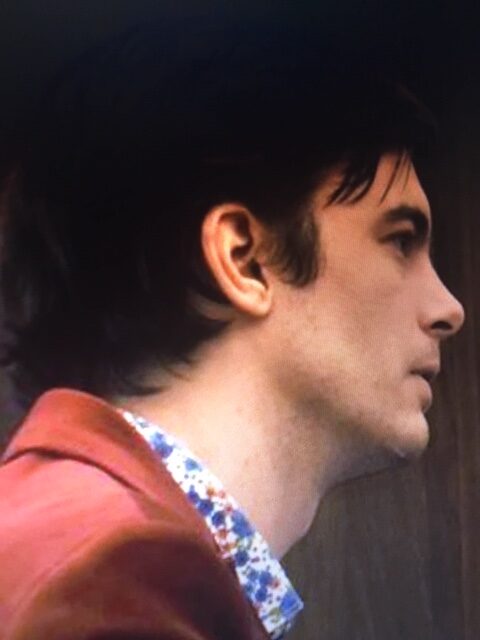
ODE OP EEN GRIEKSE VAAS
Gij maagdelijke bruid van zwijgzaamheid,
gij pleegkind van de stilte en trage stonden,
kroniek van ’t woud, der bloemen faam bepleit
zoeter dan onze rijmsels dat ooit konden!
Welk mythe bladdert van uw vormen af,
van goden, stervelingen, of van beide,
uit Tempi; een Arcadische vallei?
Welk mansfiguren en afkerig meiden?
Welk twist ontkomen? Welke jacht in draf?
Welk schel gefluit? Welk heerlijk razernij?
Zang klinkt zoet, onbemerkte melodie
is zoeter, dus, zacht instrument, speel door;
niet voor de luister, maar liever esprit:
bespeel elk ijdel geest zonder gehoor.
Jong schoon onder het loof, voor immer leent
die boom zijn blad, gelijk resteert uw zang.
brutale minnaar, zo uw doel dichtbij,
nooit kust u haar. Dat u dit niet beweent:
al grijpt u naast ’t geluk, zij straalt altijd,
u mint voor eeuwig, schoon blijft zij zo lang!
Blijmoedig elke tak! Nooit verlaat u
het lover, of wenst Lente u vaarwel;
En blij de muzikant ook, die als nu
voor altijd fluiten kan zijn jeugdig spel;
Blijmoedig liefde! Liefde, blij, blij, blij!
Voor altijd vastgezet en warm genot,
voor altijd ademend, voor altijd jong,
waar al het menselijk gevoel gedijt,
verheft het hart tot schrijnen en leidt tot
een koortsig voorhoofd, uitgedroogde tong.
Wie zijn zij, komend naar dit offer toe?
Naar welk groen blok, oh duister acoliet,
leidt gij die hemelwaarts balkende koe
met ’n flank van goud waarop men bloemen ziet?
En welk gehucht bij zee, of naast ’n rivier,
of uitgehouwen in een berg, tot vrede,
werd dees vroom ochtend door dit volk ontvlucht?
Nu zullen, klein gehucht, uw pleinen hier
steeds stilblijven, geen ziel vertelt de reden
van uwer eenzaamheid, keert ooit terug.
Attica in vorm! Schoon zetsel met fijn
gemarmerd mannen, maagden ingezet,
waar boomtressen, vertrapte grassen zijn,
dolmakend is uw stille silhouet,
net als de eeuwigheid: kil herdersdicht!
Maakt ouderdom een lichting mensen rot,
gij blijft hun weldoener: wijl in hun schoot
rust ander leed, eender uw troostrijk bod:
“Schoonheid is waar, in waarheid schoonheid ligt,
da’s al men weet, en men op aarde noodt.”
—-
ODE ON A GRECIAN URN
Thou still unravish’d bride of quietness,
Thou foster-child of silence and slow time,
Sylvan historian, who canst thus express
A flowery tale more sweetly than our rhyme:
What leaf-fring’d legend haunts about thy shape
Of deities or mortals, or of both,
In Tempe or the dales of Arcady?
What men or gods are these? What maidens loth?
What mad pursuit? What struggle to escape?
What pipes and timbrels? What wild ecstasy?
Heard melodies are sweet, but those unheard
Are sweeter; therefore, ye soft pipes, play on;
Not to the sensual ear, but, more endear’d,
Pipe to the spirit ditties of no tone:
Fair youth, beneath the trees, thou canst not leave
Thy song, nor ever can those trees be bare;
Bold Lover, never, never canst thou kiss,
Though winning near the goal yet, do not grieve;
She cannot fade, though thou hast not thy bliss,
For ever wilt thou love, and she be fair!
Ah, happy, happy boughs! that cannot shed
Your leaves, nor ever bid the Spring adieu;
And, happy melodist, unwearied,
For ever piping songs for ever new;
More happy love! more happy, happy love!
For ever warm and still to be enjoy’d,
For ever panting, and for ever young;
All breathing human passion far above,
That leaves a heart high-sorrowful and cloy’d,
A burning forehead, and a parching tongue.
Who are these coming to the sacrifice?
To what green altar, O mysterious priest,
Lead’st thou that heifer lowing at the skies,
And all her silken flanks with garlands drest?
What little town by river or sea shore,
Or mountain-built with peaceful citadel,
Is emptied of this folk, this pious morn?
And, little town, thy streets for evermore
Will silent be; and not a soul to tell
Why thou art desolate, can e’er return.
O Attic shape! Fair attitude! with brede
Of marble men and maidens overwrought,
With forest branches and the trodden weed;
Thou, silent form, dost tease us out of thought
As doth eternity: Cold Pastoral!
When old age shall this generation waste,
Thou shalt remain, in midst of other woe
Than ours, a friend to man, to whom thou say’st,
“Beauty is truth, truth beauty,—that is all
Ye know on earth, and all ye need to know.”
***[John Keats.]
